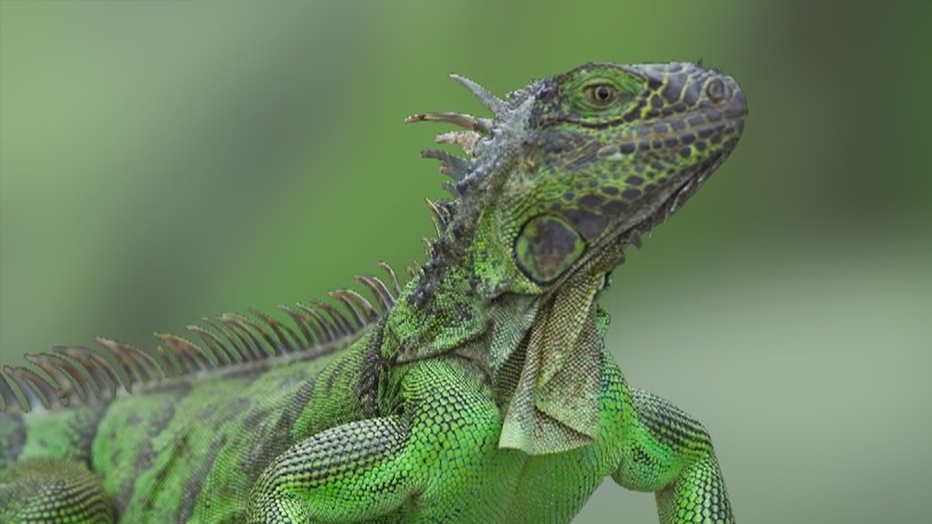Florida homeowner finds 98 iguana eggs in backyard, setting a local record
MIAMI, Fla. - A Florida homeowner recently discovered she was inadvertently hosting the reptilian version of a baby shower with 98 uninvited guests.
The woman said she called Humane Iguana Control, who told her the discovery may have set a local record, with the eggs being the most they've removed from a single site.
98 eggs found in Miami backyard
What we know:
If you thought Florida’s wildest residents were only found on South Beach, think again.
One Miami woman living in the suburbs of Palmetto Bay was appalled when she recently found 98 iguana eggs in her backyard.
Eventually, she called in the experts at Humane Iguana Control.
"We removed 98 eggs," Michael Ronquillo, owner of Humane Iguana Control, told FOX Nesws. "Three female iguanas had nested in burrows that were all interconnected, and each had laid her own clutch."
The discovery, made after several inspections and trap setups, turned into what may be a local record.
"It’s the most eggs we’ve ever removed from a single site,"Ronquillo said. "We couldn’t find another case of that many being pulled out at once."

Another day in the life of battling invasive wildlife
Dig deeper:
To anyone outside the Sunshine State, it might sound dramatic. But for South Floridians, it’s another day in the life of battling invasive wildlife.
Iguanas pose health risks, cause landscape destruction and dig burrows that can damage infrastructure.
In one local example, an iguana-related burrowing event in West Palm Beach caused $1.8 million in damage after compromising a dam.
"We’ve seen them dig under streets, sidewalks and sea walls," Ronquillo said. "And if they’re digging in your backyard, you might not know it until the ground collapses under you."
Beyond property concerns, iguanas also pose a sanitation issue.
"They’ll defecate around pools, schools, playgrounds; it’s a health hazard," Ronquillo said. "We get calls from schools where kids are playing under trees, and the iguanas are just up there … going to the bathroom. Constantly."
Ronquillo said there’s a 93% hatch rate for iguana eggs.
"If the client hadn’t called us, that entire neighborhood would’ve had a serious problem in just a few months," he said. "They’ll test a bunch of spots. If the ground’s too hard or too hot, they’ll move on. But this spot — soft soil, some shade, near water — was perfect. So, they all locked onto it."
Ronquillo said the worst thing people can do is cover up the holes the iguanas make.
"We tell our clients to flag the burrows, use a little irrigation flag or something visible, and call a professional," he said. "When the holes are covered, it compacts the soil and makes it harder for us to dig the right path and remove the eggs. … Don’t try to remove it yourself, and definitely don’t put poison in the holes. Just flag it, and call a licensed removal company."
Ronquillo also cautioned locals not to try and approach iguanas, as they have sharp claws and teeth, and their tails can whip at up to 30 miles an hour.
"If you’re not experienced, you could end up in the ER," he said. "We’ve had clients try to grab one and end up with serious injuries."
Prime Florida real estate
Dig deeper:
Florida’s warm climate, abundant food sources and lack of natural predators create the perfect conditions for iguanas to thrive and multiply.
In Florida, the population of green iguanas is estimated to be well over a million. Since their establishment in the state around the 1960s, their population has been steadily increasing.
Iguanas are considered to be a highly invasive species. Their impact has been so severe that Florida classifies them as a public nuisance and encourages humane removal efforts.
"They eat native bird eggs, destroy landscaping and dig burrows that damage roads, sidewalks and even dams," Ronquillo explained.
Iguanas' breeding season typically runs from February to May. However, Ronquillo said it can technically happen all year.
"If everybody does their part, we can protect our environment and our neighborhoods," he said. "Just like this client did. It really makes a difference."
STAY CONNECTED WITH FOX 35 ORLANDO:
- Download the FOX Local app for breaking news alerts, the latest news headlines
- Download the FOX 35 Storm Team Weather app for weather alerts & radar
- Sign up for FOX 35's daily newsletter for the latest morning headlines
- FOX Local: Stream FOX 35 newscasts, FOX 35 News+, Central Florida Eats on your smart TV
The Source: This story was written based on information shared by FOX News and Humane Iguana Control.

